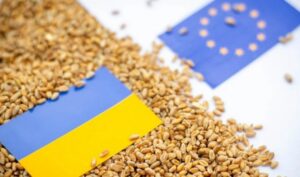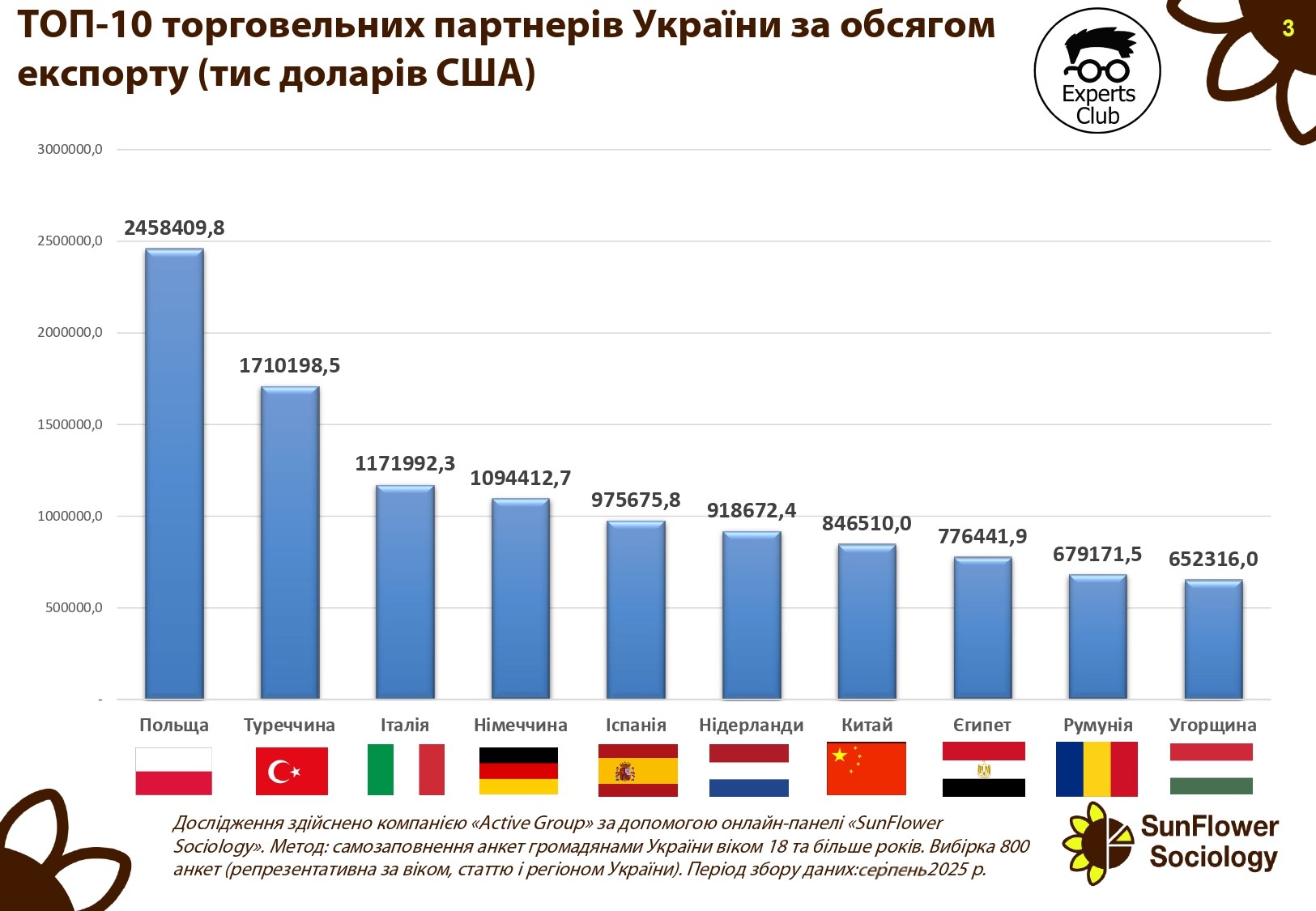
In September 2025, Ukraine exported 3.7 million tons of agricultural products, which is 6.5% less than in the previous month and 25% less than in the same period of 2024, according to the Ukrainian Agribusiness Club (UAC).
“The two main reasons for this trend are the two- to three-week delay in harvesting compared to the same period last year and the introduction of duties on soybean and rapeseed exports, which significantly reduced shipments, in particular due to the lack of an established mechanism. Oilseed exports fell by 53%,” experts explained.
Analysts noted that the structure of exports in September 2025 was as follows: grain crops – 2.4 million tons (wheat – 86%, barley – 12%, corn – 2%), which is 1% less than the previous month; oilseeds – down 53% to 322.4 thousand tons (rapeseed – 73%, soybeans – 24%, flax – 2%); vegetable oils – up 48% to 313.3 thousand tons (sunflower oil – 53%, rapeseed – 35% and soybean – 12%); oilcake after extraction of vegetable oils – 281.0 thousand tons (sunflower – 62%, soybean – 38%), which corresponds to last year’s figure. Exports of other types of agricultural products increased by 5% to 340,000 tons.
“Next month, we expect an increase in exports of agricultural products due to an increase in the volume of late crops harvested and the optimization of soybean and rapeseed export processes,” the UACB concluded.

In January-July 2025, Ukraine exported agricultural and food products worth $5.73 billion to the European Union, which is $891 million, or 13%, less than in the same period last year, according to an EU report.
At the same time, Ukraine managed to maintain its fourth place in the list of suppliers of agricultural products to the EU during this period. Ahead of it are Brazil ($9.1 billion), the United Kingdom ($7.8 billion), and the United States ($6.9 billion).
The ranking of the largest suppliers of agricultural products to the EU also includes China ($5.24 billion), Côte d’Ivoire ($5.05 billion), Turkey ($3.68 billion), Vietnam ($2.81 billion), Argentina ($2.57 billion), and Switzerland ($2.51 billion).
In total, agricultural imports to the EU in January-July 2025 are estimated at $96.8 billion (+16%).
Agricultural exports from the EU during the same period amounted to $118.7 billion (+2%). At the same time, $2.1 billion (+17%) worth of goods were supplied to Ukraine.

As of September 22, Ukraine had exported nearly 1.7 million tons of wheat, and there is enough product on the market to cover contracts, which is holding back price growth, but the situation may change in October.
This forecast was announced by the analytical cooperative “Pusk,” created within the framework of the All-Ukrainian Agrarian Council (VAR).
“The indicative price for third-class wheat remains at $212–214 CPT-port. This is due to sufficient product reserves among traders and high supply on the global market, especially from Russia,” its analysts noted.
According to their information, coverage of wheat contracts for November-December will significantly decrease for many market players.
“Contracts for October are already being concluded at a price of $218-220 CPT-port with a potential increase to $223. The main reason is a reduction in stocks and growing uncertainty about the future harvest,” the experts explained.
Climate risks in countries that are major wheat producers will be the leading factor supporting prices.
“In Ukraine, the central and southern regions are suffering from drought, and no significant rainfall is forecast in the near future. Russia is also experiencing a critical moisture deficit, and the pace of sowing is the slowest in the last five years. A similar situation is observed in France, Romania, and Bulgaria, where moisture shortages are threatening winter wheat yields. Given this, there is a threat of a reduction in winter crop areas. Importers, anticipating potential problems with the 2026 harvest, may purchase grain more actively. Therefore, wheat prices may rise significantly in January-March,” Pusk states.

According to the results of the first half of 2025, Poland remains Ukraine’s main trading partner in terms of export volumes. According to research by Active Group and Experts Club, exports to Poland amounted to US$2.45 billion.
Turkey ranks second with USD 1.71 billion, and Italy ranks third with USD 1.17 billion. Other major partners include: Germany ($1.09 billion), Spain ($976 million), the Netherlands ($919 million), China ($847 million), Egypt ($776 million), Romania ($679 million), and Hungary ($652 million).

“The structure of Ukraine’s exports shows a clear focus on European Union countries. Poland, Italy, Germany, Spain, and the Netherlands together account for more than half of total exports. This indicates Ukraine’s strategic integration into the European economic space,” emphasized Maksim Urakin, founder of Experts Club and economist.
He also noted that Turkey remains a critically important partner for Ukrainian agricultural and metallurgical exports, while China and Egypt are key markets for agricultural products, particularly grains.
“The presence of trading partners such as Egypt and China diversifies Ukrainian exports,” Urakin added.
CHINA, ECONOMY, EGYPT, EXPERTS CLUB, EXPORTS, GERMANY, HUNGARY, ITALY, POLAND, ROMANIA, TRADE, TURKEY, UKRAINE, МАКСИМ УРАКИН

In the first 16 days of September, 1 million 48.9 thousand tons of grain were exported by rail, which is 19.2% less than in August. Compared to the same period last year, the reduction amounted to 8.8%, according to the Rail.insider portal.
According to Valery Tkachev, deputy director of the transport technology and commercial operations department at Ukrzaliznytsia, 981,000 tons of grain were loaded onto the network in September, which is 12.5% less than a year earlier.
The total volume of all cargo transported during this period reached 1.25 million tons, which is 10.2% less than last year and 11.4% less than in August.
Most of the grain – 979,500 tons (93.4%) – was delivered to seaports. Only 69,400 tons (6.6%) were sent to western border crossings.
Since the beginning of September, almost 568,000 tons of grain have already been exported by rail.
In addition, since the beginning of the 2025/2026 marketing year (July 1), Ukraine has exported 5.028 million tons of grain and legumes. For comparison, during the same period last year (as of September 13, 2024), this figure was 8.59 million tons, meaning that the pace of exports has slowed significantly.

In January-August of this year, Ukraine reduced exports of semi-finished carbon steel products in physical terms by 39.1% compared to the same period last year, to 795,769 thousand tons.
According to statistics released by the State Customs Service (SCS), in monetary terms, exports of carbon steel semi-finished products fell by 40.8% to $384.215 million.
The main exports were mainly to Bulgaria (39.36% of supplies in monetary terms), Turkey (16.42%), and Poland (14.38%).
During this period, Ukraine imported 46,604 thousand tons of semi-finished products worth $35.242 million, mainly from Oman (38.41%), Germany (26.24%), and the Czech Republic (18.61%), while in the first eight months of 2024, it imported 5 tons of semi-finished products worth $5 thousand.
As reported, in 2024, Ukraine increased its exports of semi-finished carbon steel products in physical terms by 56.7% compared to 2023, to 1 million 886,090 tons, while revenue in monetary terms increased by 52.4% to $927.554 million. The main exports were to Bulgaria (32.06% of supplies in monetary terms), Egypt (18.50%), and Turkey (11.14%).
In 2024, Ukraine imported 306 tons of semi-finished products worth $278 thousand from the Czech Republic (88.13%), Romania (7.19%), and Poland (2.88%), while in 2023, it imported 96 tons worth $172 thousand.